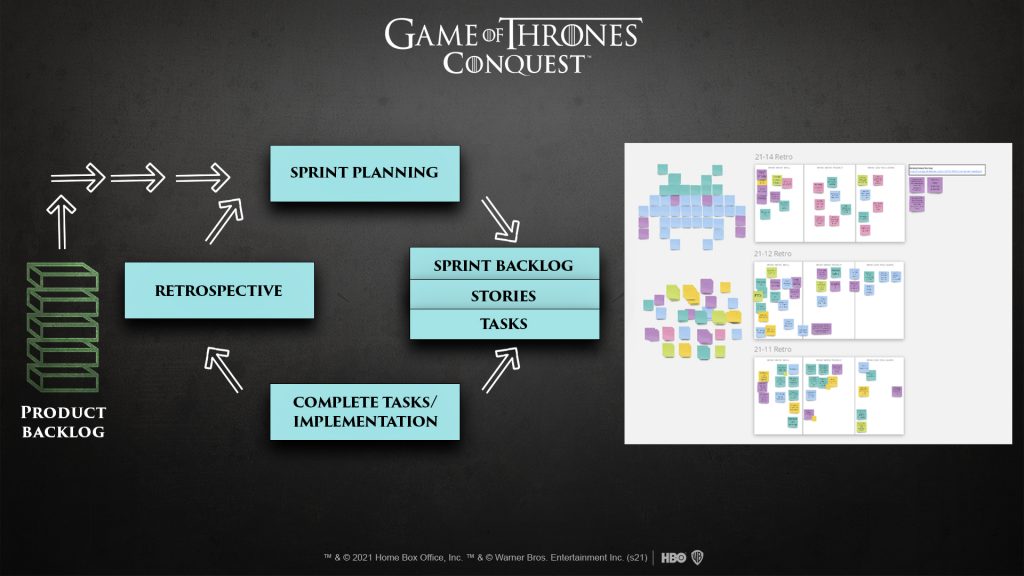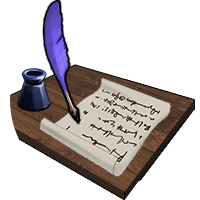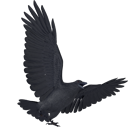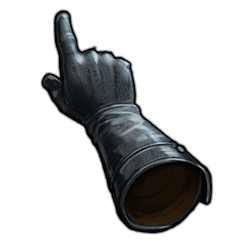Welcome to the second installment of our Developer Interview Series. I’m Sitri, Community Intern, and together we’re discovering the roles inside the team that creates Game of Thrones: Conquest!
Thank you to everyone who chimed in within the community about our last interview with our User Experience Design team. You can join the conversation over on Discord if you have any questions for our next installment!

This month we’ll be interviewing several of our Producers and learning how they tie all the work at our studio together.
Senior Producer Cartridge, is on the Feature Development side of Production, where any new content we want to create is developed within a feature ‘Pod’, or a cross-discipline group. This group contains representation from everyone from server and client engineers, to Art and QA, all working together to bring new content into existence. Each pod also tackles bugs that are created in the process, as well as regular ‘Bug Sprints’ to tackle the backlog.
Mid-Level Producer Dspumoni and Associate Producer Phi are on the Live Operations (LiveOps) side of Production. LiveOps concerns the details of running a live service. This is the group who schedules events, plans arc themes and content release like Heroes or Gear. When a feature pod has a finished product to deliver, it’s often handed off to the LiveOps team to enable and roll out.
As this series will demonstrate, there are a lot of moving pieces involved in taking an idea from concept to completion! Making sure that all the different disciplines involved are communicating, have what they need and are hitting deadlines is a crucial job. Producers are the glue that holds all these pieces together, ensuring that implementers can focus on developing the best game experiences they can for our players in Game of Thrones: Conquest!

Q: What’s the day in the life of a Producer for Game of Thrones: Conquest?
Phi: Every day is a new challenge, but generally I start by looking at which meetings I have to prepare for, as I generally lead a lot of them. Outside of meetings, I spend a lot of time writing and maintaining projects on our task-tracking platform and following up on work that’s in motion.
Cartridge: As a Feature Development Producer, we’re pushing to get new features through our pipeline, from concept to pre-production, to production to release, to supporting events and revisiting the whole way around again based on how players received everything. We’re often setting up wiki pages and dashboards to track everything and blasting out status and follow-up emails.
Dspumoni: On the Live Operations side, I manage the workflow for all the regular content we put out to our players in any given month. If you think about a month-long arc like Freedom of Essos, all the events, the gear, the trinkets, the heroes and all content that go live are under my purview.
Our developers within Design and Product Management work together to create a plan for what each month’s worth of content will look like months in advance before our creative teams can start working on key art or new creature models. A lot of what I do is to try to pull together that plan. Once we have that approved, we write up the tasks for our different implementers so they can start to work towards and execute that plan.

On the left is a diagram demonstrating the high-level stages in our bi-weekly Sprint Cycles. Sprint Cycles are short iterative periods of time where our teams complete a set amount of work until the next cycle. On the right are notes from one of our team’s sprint retrospective meetings, where Production identifies what our teams’ top priority action items should be for the work in the upcoming Sprint Cycle.
Q: Explain your workflow; how do you organize, plan and prioritize projects?
Phi: We have to be meticulous in the organization and planning of our projects. Our Production team does large-scale roadmap planning for the studio’s teams that span months and even years, all the way down to the granular planning of 2-week sprints. We utilize various tools to track different units of work and try to adjust the processes to whatever works best for the individual teams whenever possible. When it comes to prioritization within Live Operations, for smaller scale work we’ll typically prioritize the work that goes live to players first. For larger scale initiatives, our Product Team usually weighs in after evaluating the potential business impact.
Cartridge: I write everything down! From task and bug management software to road mapping programs, if we’re not hyper organized, it’s easy to miss things. No matter how big or small something is, we make sure it’s logged and tracked. If it’s important enough for the team to work on, it’s important enough for us to keep track of it.
Dspumoni: My workflow has two parts to it. The first part pertains to organizing for my team. We maintain a lot of documentation on all our plans, including proposals for new features and new iterations for pre-existing content. We’ll write up all the individual tasks for each of our implementers – a.k.a. our developers – to make sure it’s reflective of the work that they need to do to complete the deliverable.
We organize the tasks into a slate of work that we’ll commit to over the course of a two-week sprint, and we keep track of exactly how productive we’re able to be in that given sprint to make sure we’re not overloading our developers.
There’s also a lot of organization I need to do for myself in terms of keeping track of everything I need to follow up on, whether it’s chasing down deliverables or gathering more information to better understand tasks.

Simplified, high-level stages of Production’s workflow in facilitating product development.
Q: What are some common misconceptions about what you do?
Phi: I think when people usually think of Producers, they’re imagining movies or music. Production can be a lesser thought about aspects of game development. However, almost every element in any given game came into fruition with the assistance of a Producer.
Cartridge: A common misconception is that Production makes decisions on our own and that we sort of hand things down to the team from up on high, when nothing could be further from the truth. We bring the team together to make decisions and do everything we can to get buy-ins from the entire team before moving forward.

Q: How important is collaboration as a Producer?
Phi: The overwhelming majority of the meetings I lead serve the function of bringing various departments together. A Producer needs to have an understanding of the work that all of the different disciplines on their teams do. They also need to be able to resolve conflicts that arise between these groups and ensure the product is not negatively impacted as a result.
Dspumoni: Collaboration is key to the work of a Producer. We’re less of an individual contributor on the development team, and more of a coordinator and an organizer in making sure that the people who are the individual contributors have what they need to be able to execute their work.
Cartridge: When collaborating with teams, we talk to them, but more importantly, we listen. I have the privilege of working with some of the smartest people I’ve ever met, and they’re all experts in their domains. I’m here to facilitate, which means letting the experts be experts at what they do.

Example of a Product Roadmap with initiatives and dates for Live Tools, Tech Design and Core Server teams.
Q: How does player feedback tie into your work?
Phi: Many of the teams I support rely on player feedback to inform their decisions. For example, the Designers and Product Managers on the Crafting and Hero teams value community feedback on Gear and Heroes respectively, and factor it into their monthly planning processes.
Producers also have a rotating on-call schedule for live assistance, and player feedback can be the first red flag of an on-going live issue. If a member of our community team notices chatter on Discord about something seeming off in the game, they will alert the team, and a Producer will wrangle the right people to investigate the potential issue.
Cartridge: One of the best things about working on a long running live game with such an engaged player base is that we can incorporate player feedback into everything we do. From what new features we should work on, to what are the biggest player complaints of bugs and pain points, we always try to make sure we ask the question “what would the players want us to do?”
We do in-house player usability testing of early in-development features and have a comprehensive live test plan we run through on every release. We love getting feedback from a small handful of kingdoms before going global with a feature. Sometimes we’ll continue with the release and that feedback will make it into a v2 release, or in some cases we’ll actually halt a rollout to address major issues that come up. Simply put, player feedback lets us make a better game.
…. And now let’s learn some fun facts about the team!

Q: What’s your favorite troop type?
Phi: Cavalry all day, every day. Don’t @ me.
Cartridge: I’m a Cavalry fan myself. Cavalry always makes me think of the Dothraki, and since some of my favorite scenes in Game of Thrones featured the Dothraki, anything related to them is going to have a special place in my heart.
Dspumoni: I don’t have one per se, but if I could give a goofy answer, I would say Cavalry because using them always reminds me of when the Knights of the Vale came to the rescue of Jon Snow at the Battle of the Bastards.

Q: Who’s your favorite Game of Thrones character?
Phi: Viserion. I’ve always been a huge fan of dragons and his design is definitely my favorite.
Cartridge: The master manipulator, Littlefinger. In later seasons, he underestimated some people and it ended badly for him, but up until then I think he played the game better than anyone else. “Chaos is a ladder!”
Dspumoni: I’d say that Sir Davos is probably my favorite. He’s very down-to-earth, and just a genuinely good person and friend who will be supportive of whoever he chooses to align himself with.

Q: If you were a stat, what would you be?
Phi: My Personality, Max March Size. My Job, Training Speed.
Dspumoni: I have to say that it would be Build Time Efficiency or Build Cost Efficiency because that relates the closest to the nature of the work that I do – which is working with my fellow teams to construct things.
Cartridge: Probably one of the awesome new ones we’re working on right now that haven’t been released yet ;).

We hope you enjoyed this look into Production!
Stay tuned over the coming months as we interview other disciplines and learn more about the process of developing Game of Thrones: Conquest.
What departments would you want to see interviewed? Do you have suggestions for future questions? I’d love to hear your input, as well as any other feedback or suggestions you have for the series!
Tag @Sitri on Discord in the #general-chat channel, or send a PM, and let’s chat!




